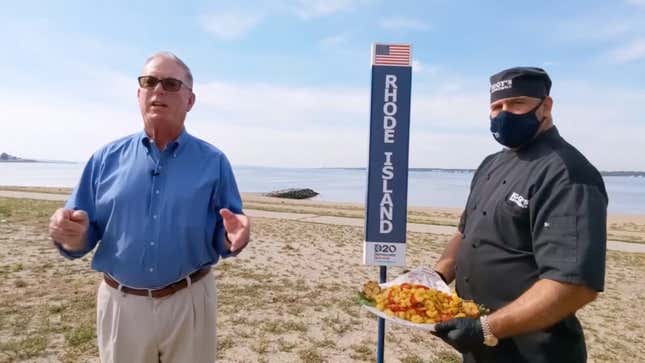
Tuesday night, former Vice President Joe Biden officially clinched the 2020 Democratic presidential nomination. Big news, to be sure. But let’s be real, the biggest moment of Tuesday night’s Democratic National Convention was the delightful roll call vote that took us on a tour of 57 states and territories, including the “calamari comeback state of Rhode Island” represented by the state’s Democratic Party chairman, Joseph McNamara, and a masked man in an all-black chef outfit holding a giant plate of squid.
Maybe it was the mysterious nature of a brolic man in black, or the fact that he held one huge honking squid rings, or just that I am sick of cooking the same five things during month six of quarantine. But whatever it was, when Rhode Island’s turn in the roll call came up, I found myself dreaming of crushing a plate of calamari in the nation’s smallest state with a quickness. I’m not alone. Our nation’s great divide appears to be healing over a shared affinity for crispy, golden calamari (which apparently is served with sautéed garlic, hot cherry peppers, and parsley in Rhode Island, which, again, hell yes).
Far be it from me to ruin our national moment of unity and dreams of deep-fried cephalopod. But I feel it is my duty as a climate journalist to let you know that there is a rather bummer reason why Rhode Island has laid claimed to the calamari comeback moniker. Yes, it’s climate change (I’m sorry) and a history of overfishing (sorry again).
Rhode Island is a tiny state by land, but it has 384 miles of shoreline. From tourism to fisheries, the state’s fate and the sea are heavily entwined. Fisheries alone contributed $538 million to the economy in 2016, according to a University of Rhode Island report. Of that, the biggest value species landed was squid. In fact, Rhode Island isn’t just the calamari comeback state; it’s the “king of squid,” landing 54% of all squid caught in the Northeast.
I think we’ve established the calamari bonafides at this point, but it wasn’t always this way. Rhode Island, like other New England states, was once a huge cod fishery. At its peak, commercial boats operating out of Rhode Island landed 3.8 million pounds of cod in 1991, according to National Oceanic and Atmospheric Administration data. But overfishing led cod populations—and the amount of cod landed—to basically fall off a cliff. Just three years later, Rhode Island boats brought home 585,873 pounds of cod. Last year, it was just 16,539 pounds, the NOAA data shows.
Lobster? Same story. Quahog? Ditto. At the same time as overfishing took a toll, so did rising temperatures that hit Rhode Island—the southern edge of the range for lobster—the hardest. Narragansett Bay, the body of water that cuts into Rhode Island and gives it its jagged shape, has warmed 2.2 degrees Fahrenheit (1.2 degrees Celsius) since 1950 alone. To the north, the Gulf of Maine is one of the fastest-warming bodies of water in the world.
The state’s fisheries have seen an uptick in warmer water species once rarer in the area, but it’s been squid that really taken off as the primo fishery of Rhode Island. And that, my friends, is how we ended up with a masked chef standing on a beach holding a calamari plate the size of an infant on Tuesday night.
Whether that holds true as the planet keeps warming is an area of active area of research. Some research suggests squid could keep expanding northward on the other side of the Atlantic into the North Sea, with the 2016 study on the topic noting that “at least for the last 35 years, climate change appears to have been largely favorable for squid and with changes in climate set to continue, squid may end up beneficiaries where many finfish struggle.”
“Squid definitely react to changing ocean temperatures,” Miriam Goldstein, the director of ocean policy at the Center for American Progress, said in an email. (She also has a Twitter thread on the topic, which inspired this blog.) “For example, in South America, squid have moved from Peru to Chile seeking colder waters. Many squid are also very adaptable in their diets which might help them adapt. However, ocean acidification linked to carbon emissions may also make it hard for squid to reproduce.”
Could Norway or Chile come for Rhode Island’s squid crown? Will turning the seas acidic ruin cephalopods’ sex lives to the point of no return? TBD, but it’s probably something we should figure out and quick.
“The protection of people and communities most vulnerable to climate impacts must go hand in hand with protecting the environment,” Goldstein said. “Environmental justice and a healthy ocean are inextricably linked. A better ocean future needs to prioritize equitable resiliency planning and investments just as much as smart science-based fisheries management. Without healthy communities, it’s hard to have healthy fisheries.”
And without healthy fisheries, it’s hard to have calamari. If this doesn’t get you behind the Green (or Blue!) New Deal, I don’t know what will.